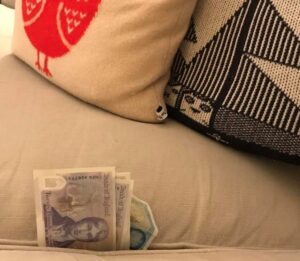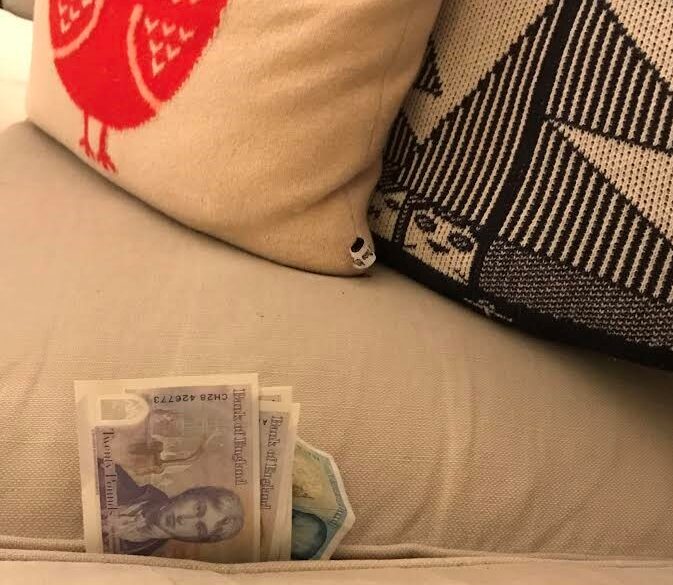12 November 2020
Does your drug dealer have a card reader?
Should Rishi be buying second-hand sofas?
By Frank O’Nomics
 £50 billion has gone missing. Sounds careless, doesn’t it? At a time when the government needs to secure every penny for healthcare and countering the economic effects of the pandemic, even a small fraction of this money would be very useful. The problem is that the various government entities charged with monitoring cash are not communicating. They need to know where it has gone and how much of it is due to them.
£50 billion has gone missing. Sounds careless, doesn’t it? At a time when the government needs to secure every penny for healthcare and countering the economic effects of the pandemic, even a small fraction of this money would be very useful. The problem is that the various government entities charged with monitoring cash are not communicating. They need to know where it has gone and how much of it is due to them.
First a little background. Twenty years ago the value of cash in circulation was around £24bn, but this has now rocketed to £76.5bn. The National Audit Office estimates that 20-24% of this money is being used for cash transactions, with a further 5% held in savings. That leaves around £50bn unaccounted for, or virtually all of the increase since 2000. So where has it all gone?
One key driver may be geopolitical. The amount of sterling cash held overseas could have increased as it is regarded as portable and safe. This is a reasonable argument to a degree, but there is generally regarded to be greater safety (and lower exchange rate volatility) in dollars and euros. It seems more likely that cash savings have increased domestically. Every day there is a press article talking of the prospect of negative interest rates and, while this has yet to transpire, the opportunity cost for keeping money at home rather than in a bank has fallen significantly, with most current accounts paying nothing and many savings accounts as little as 0.01%.
Money under the mattress (rather than lost down the side of the sofa) or, hopefully, held in home safes may be greater than it was, but can only account for a fraction of £50bn. Official data suggests that cash transactions have fallen significantly, from six in ten transactions a decade ago to three in ten last year. This fall is likely to have accelerated this year as the pandemic has created a fear of handling notes and coins. However, official data does not capture everything. The much greater probability seems to lie in the amount of cash circulating within the “shadow economy”, where transactions take place using cash to avoid scrutiny (the drug dealers part) and paying tax. Estimates of the GDP contributions of prostitution and illegal drugs have been made since 2014, when the amount was seen to be as £10bn; it seems likely that this amount has risen over the last 6 years. Beyond that, how many people pay their domestic cleaners, window cleaners and gardeners in cash? This may not be much greater than it was, but there is a large sum of National Insurance and VAT going amiss. The prospect of saving 20% VAT when rates on savings are so low has become more compelling, and so many more goods and services are being paid for in cash. Cars and building works are obvious examples, but it goes way beyond this. Our recently acquired puppy was paid for in cash. The dog is registered and the transaction properly documented, with no suggestion that the breeder is avoiding tax. However, his desire for cash may well be due to having to pay others down the supply chain via that medium.
How much is all of this costing? If 20bn was money being spent that avoided VAT, the cost could still be more than 4bn tax not received. The big question is how many times this amount of money turns over each year. Looking at UK official money supply data overall, the velocity of circulation has been declining for some time and is less than 1. This goes a long way to explain why vast sums of quantitative easing have failed to generate any material inflation (yet). However, the circulation of the missing cash in the shadow economy could be much greater than 1 and hence the tax being missed is much more significant.
As with many economic conundrums, the answer to the missing billions is that we just don’t know. The disturbing factor here is that there is little that is being done to get to the bottom of the matter. Currently there are five public bodies that are responsible for the overseeing of the UK’s cash system: The Treasury, the Bank of England, the Royal Mint, the Financial Conduct Authority and the Payments System Regulator. Sadly, there seems to be little communication or coordination between these bodies, and certainly not sufficient to help us gain a better understanding of where the missing money lies.
So what do we do in the interim? Perhaps the Chancellor of the Exchequer could instruct the treasury to buy up all second hand sofas and mattresses to harvest what has been lost, or perhaps we should be asking our drug dealers for a VAT receipt.


